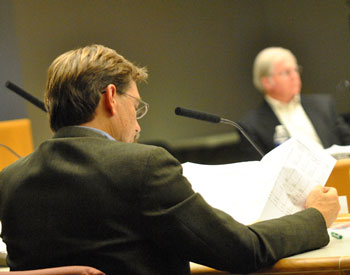AATA OKs Smaller Budget, Drives Ahead
Ann Arbor Transportation Authority board meeting (Sept. 27, 2012): The main business transacted by the AATA board was approval of the operating budget for the coming year, which starts Oct. 1.

Charles Griffith looks at a budget spreadsheet during the Sept. 27, 2012 meeting of the Ann Arbor Transportation Authority board. (Photos by the writer.)
Compared to an earlier draft budget, the one approved by the board was diminished on the revenue side by $800,000 in less-than-expected state operating assistance. Subsequent reductions in expenses still resulted in the need to use $300,000 in reserves to cover the gap. The reduction in state operating assistance for the AATA is related to a dramatic budget decrease by a Detroit transit agency – the state’s formula for making its allocations is sensitive to that.
The meeting’s budget discussion overlapped with conversation about the new transit authority, which is likely to be incorporated next week on Oct. 3. That’s the day after the AATA board is scheduled to meet in a special session, when it’s expected to request formally that the Washtenaw County clerk file articles of incorporation with the state. The new transit authority is to be called The Washtenaw Ride. Before any assets could be transferred from the AATA to The Washtenaw Ride, voters would need to approve a funding mechanism, likely through a millage to be placed on the ballot as soon as May 2013.
AATA board members made a point to stress that the planned operating deficits for the year that’s now ending (about $1 million) and the upcoming year ($300,000) are not sustainable. Instead, those budgets reflect an early implementation of some expanded services – like increased frequency on Route #4 between Ann Arbor and Ypsilanti – which the AATA would like to implement more permanently in the context of the broader governance and service area of a new transit authority. Some currently expanded services might need to be scaled back if the new authority winds up being dissolved at the end of 2014 – a possibility if voters do not authorize the necessary funding.
The incorporation of the new authority has statutory implications. Because the incorporation of a new transit authority will include by default all the jurisdictions in Washtenaw County, the filing of the articles opens a 30-day window for jurisdictions to opt out of participation. That can be accomplished through a vote by a jurisdiction’s governing body.
The possibility of several jurisdictions opting out prompted the introduction of a resolution at the Sept. 27 meeting that was not originally on the agenda. That resolution was meant to clarify that the AATA board is keen to allow all the constituencies to be represented on the new authority that have been represented for about a year on the as-yet-unincorporated board – up to the point when a millage is placed on the ballot. That is, the current AATA board members – who will also serve on the new board – do not intend that their first response to opt-outs would be to alter the new board’s composition.
The articles of incorporation for the new authority specify an initial board membership of 15 members in eight districts. Altering that membership would, by the articles of incorporation, require a 4/5 majority (12 votes). So the resolution floated at the Sept. 27 meeting was intended to give assurance that the seven AATA board members – as future members of the 15-member board – would not want to alter the composition of the new board until a decision is made about putting a transit millage on the ballot. At that point, a change likely would be made to avoid the possibility of “representation without taxation.”
Representatives of three of the seven non-Ann Arbor districts in the new authority attended the AATA’s Sept. 27 meeting and participated in the discussion: Karen Lovejoy Roe (Southeast District); Bill Lavery (South Middle District); and David Read (North Middle District). Lovejoy and Read reacted to the uncertainty that the resolution was meant to address by questioning the timing of the planned incorporation.
Another significant business item transacted at the meeting was the contingent approval of a contract with URS Corp. to continue studying a possible transportation connector between the northeast and south sides of Ann Arbor. The authorization of the contract is conditional on additional local funding – in the amount of $60,000. The $60,000 would be part of a total $300,000 local match for a $1.2 million federal grant. The Ann Arbor city council had voted initially to reject a request that it provide the $60,000, but then reconsidered and postponed the question until Oct. 15. In the meantime, the board of the Ann Arbor Downtown Development Authority has indicated some willingness to make a contribution – $30,000 of the requested $60,000.
The AATA board’s Sept. 27 meeting marked Jesse Bernstein’s final meeting as chair. He’s led the board for the last two years. At the meeting, Bernstein alluded to the tradition of rotating the chairship of the board, a tradition he wanted to continue. The board elected Charles Griffith as chair. [Full Story]




